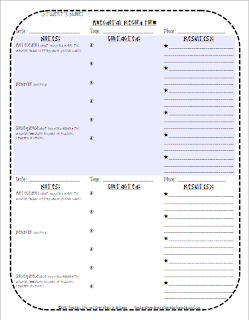Testing on a Friday...are they kidding me??!! But I digress!!
Well, with all this testing, other issues come into play...lack of routines, built up anxiety, spring fever, and senioritis (as Mrs. Thompson of Nerdy, Nerdy, Nerdy calls it in her March Madness post!)
I'm definitely feeling the same way as the kids! The jumbled schedules and the back to back lunch and prep is killing me--as well as the behavior of my class. I feel like the drama is on overdrive and it's one issue compounded with the next. (The best part is that it doesn't happen when I'm in the room...yet, I'm left picking up the pieces! Funny how that works out!)
Anywho, to help me keep track of these unwanted behaviors (and cover all my bases...a little C. Y. A., if you know what I mean ;) I put this together to help me...
 |
| Click HERE to get this |
It's an anecdotal record form to keep track of what's happening with the kids in my class. (Sorry it's so blurry!!) I started using it today and it was very convenient. (I tried jotting all the information in a notebook, but it wasn't as organized. I have a thing with finding information quickly and easily!)
What do you use to help maintain order during the last months?
Also, I'd love to hear your comments about this freebie if you download it :o)





